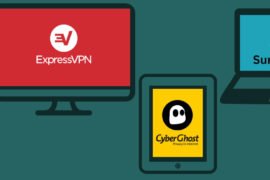A VPN, or virtual private network, is an internet security service that establishes an encrypted connection between your device and a server. It bypasses organizational and regional censorship and protects your online activity from attackers.
VPNs play a significant role in protecting remote work. Nearly 43% of workers use a VPN while working from home; 38% skip it and don’t know they’re using one. This highlights that, although security is crucial, many remote workers either bypass VPNs or remain unaware of their usage. In the workplace, VPNs are widely used to secure remote connections, and many companies require them for safe access.
It indicates the growing adoption of VPN services across diverse user bases. However, this article focuses on the key advantages of virtual private networks for remote work. Let’s
Let’s explore them blow-by-blow:
Top 7 Benefits of Utilizing VPNs for Remote Workers
1. Keep Sensitive Workplace Data Protected
Most reputable VPN providers offer Point-to-Point Tunneling Protocol (PPTP), which establishes a secure connection. Thus, it is easy to protect your workplace data and intellectual property while using these VPNs.
Similarly, virtual private networks’ no-log policy helps remote workers keep financial documents and login credentials secure. Therefore, online hackers can’t access these classified details.
2. Cost-Efficient Security Solution
Companies and remote workers also consider VPNs a cost-effective option compared to other security solutions. Yes, it is simple to find a service provider online, and you can subscribe to reasonably priced plans. Typically, the monthly cost of a VPN solution ranges between $2 and $10.
3. Lowers the Risk of Cyber Attacks
Another appealing perk of using VPNs is the reduced risk of cyber threats. Indeed, remote workers are the most vulnerable because they don’t rely on the company’s infrastructure and firewall, making them easier to target.
However, when you use a VPN, it becomes more difficult for malware and other suspicious tools to steal your confidential data.
4. Remote Collaboration
High productivity is an outcome of better collaborations between remote workers. Although communication tools have made online interactions easy, you can’t say your data will remain encrypted on different platforms.
That is why it is essential to use a VPN to keep your shared files, chats with teammates, and other documents secure. Similarly, enable these services during virtual meetings to prevent data leaks.
5. Safety with Public Wi-Fi
It would be wrong for any of you to say you never use public Wi-Fi as a remote worker. Yes, it is a reality that using public Wi-Fi has become common among tech users. Sometimes, we work from a library, an airport, a hotel room, or a coffee shop.
So, when you can’t negate the probability of using public Wi-Fi, you must be ready to avoid potential threats associated with these networks. However, using a premium VPN over the public internet can help protect your financial, personal, and business data from evil twin attacks.
6. Access to Banned Websites
Another reality is that many websites, apps, and social media platforms are blocked in some countries. Likewise, you can’t use Google and its GCP products in China. Similarly, the acclaimed social media platform X (formerly Twitter) is blocked in many countries.
Therefore, if you want to access these websites, you can use a VPN. In this regard, it is not necessary to choose a paid solution; you can unblock these sites using Chrome extensions for free. Yes, many VPN providers offer 4 to 5 free server locations with their free Chrome extensions.
Unblocking these sites makes it seamless for remote workers to enhance their work effectiveness and productivity.
7. Remote Access
It is complicated for remote employees to access a company’s infrastructure when they are not physically present in the office. VPNs resolve this problem. They craft a protected tunnel between the firm’s servers and your remote device.
This way, you can securely access the company’s resources without worrying about security breaches.
Risks of Using VPNs for Remote Work
VPNs have several appealing benefits and drawbacks to consider before employing. Let’s have a look at these limitations:
Speed Issues
Although premium VPN services are quite fast but, you can still face speed issues. Especially if you choose server locations farther away, using a VPN can slow your internet speed. By the same token, speed issues are also typically associated with free-tier VPN plans.
Dependence on Third-Party Vendors
When you use a VPN, you must rely on third-party vendors. This situation is likely not problematic for startups that do not handle sensitive data. However, dependence on a third-party solution could be a nightmare for enterprise-grade businesses that work on their own infrastructure.
Expose Your Credentials
Another drawback of using VPNs is the risk of disclosing personal data and company logs. Although some service providers follow a zero-log policy and strictly enforce it, isn’t isn’t always the case. Data interception and monitoring incidents have increased recently, so you should remain vigilant.
Things to Consider When Choosing a VPN Service
- It must use AES-256/military-grade encryption.
- A service provider should have a large number of servers globally installed. Therefore, you will get the ultrafast browsing speed.
- It should support a considerable number of devices. This way, you can easily activate a VPN for your tablet, desktop, and smartphone devices.
- Before buying a VPN subscription, you should read reviews from past customers. This will help you choose the right option.
- It is also important that a VPN provider offers 24/7, user-friendly customer support.
Conclusion
Overall, VPNs offer advantages for remote workers, including enhanced cybersecurity, protected workplace data, cost efficiency, and improved team collaboration. However, this guide also discusses the risks associated with these services. So, you must consider these pros and cons in detail before deciding.
Best of luck!



